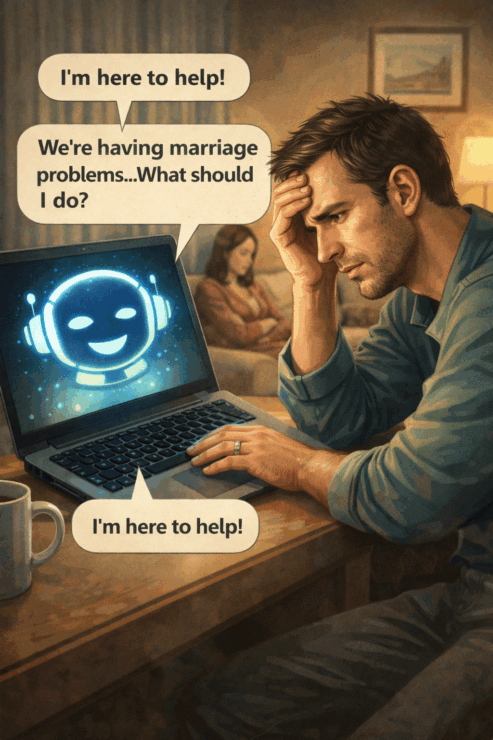A new LexisNexis study reflects deep concern over developing critical thinking skills among young lawyers in the age of GenAI. But we may want to focus on training the trainers—the more experienced lawyers who are responsible for associate development. And think about associate development in new ways. Here’s my post for Above the Law.
Uncategorized
I’ve Taken Steps To Protect My Client’s Documents: But What Happens Post-Production?
You produce your client’s documents to the other side during discovery. But how confident are you that opposing counsel won’t end up feeding your sensitive documents into ChatGPT or a similar LLM? With AI agents proliferating and integration everywhere, post-production document security has become the potentially problematic. We can control our own shop, but once…
Using GenAI for Relationship or Career Advice? Danger Will Robinson
Got a problem? Ask GenAI to decide what to do:

Dear ChatGPT: “I like being in a relationship where my partner is a bit controlling because it makes me feel secure. Is this normal?
Dear Gemini: My partner is gaslighting me and I think he’s abusive. Should I leave immediately and cut him off forever?…
Meeting Jurors Where They Are in 2026. Not 1976
What sort of people were these? What were they talking about? What office did they belong to?
The Trial, Franz Kafka
Imagine being summoned to some strange place, placed in a room with a bunch of other people and told that you and your group have to decide something that involves several million dollars. No…
Think You Are Covered? Better Read Your Cybersecurity Policy — Carefully
Think your law firm’s cybersecurity insurance has you covered? Think again.
New survey data reveals troubling gaps: only 45% of policies cover ransomware, despite 1 in 5 organizations reporting ransomware incidents.
And 45% of policies can be voided due to inadequate security controls, something many firms only discover after filing a claim.
Law firms need…
Trust Us We’re Algorithms. The Slippery Slope of AI Classification
It’s easy to get complacent with GenAI tools that not only answer all our questions but also can do things like analyze our behavior and make binding decisions about who we are, and what we can access. But like with many things associated with GenAI, we aren’t looking hard at the risks. The “What Ifs.”
OpenAI’s Age Prediction Model

We can see this with OpenAI’s announced use of age predication modeling to determine whether a user is underage. It’s hard to argue against something like this that sounds good. But there are some risks. Some proverbial slippery slopes.Continue Reading Trust Us We’re Algorithms. The Slippery Slope of AI Classification
Proposed Evidentiary Rule 707: Addressing A Nonexistent Problem Instead Of Real Ones
Proposed Rule 707: a solution in search of a problem. Neither plaintiffs nor in house lawyers are excited.
And while Rule making authorites debate this proposed new federal rule about AI-generated evidence, we’re ignoring real crises: deepfake proliferation, cost of trials and litigation and the time required for dispute resolution.
Here’s my post for Above
GenAI Courses In Law School: A Good Idea
Here is my recent Above the Law Post: Cleveland State University College of Law and AltaClaro just launched a course entitled “Fundamentals of Prompt Engineering for Lawyers” and 130+ students immediately signed up. It’s a great idea.
But right now it’s just extracurricular.
If GenAI competency is truly essential (and ethical rules would suggest…
A New Product That Helps Small Firms Manage the Contract Change Flood
How can small firms stay on top of the contract change flood from software providers?
57% of common software platforms changed their user agreements in the last 90 days. 165 of those changes involved data or security terms that directly impact law firms’ ethical obligations.
When we get notice of changes in terms with our…
Less Hours Worked & Fewer Lawyers Needed: Dealing With The New AI Reality
A new Thomson Reuters Report reveals what may be an uncomfortable reality that many don’t want to hear. Quite simply, AI will require fewer lawyers and less billable time to do tasks. But 90% of legal dollars still flow through hourly billing which is the same structure we’ve had since the 1950s. Think about the…